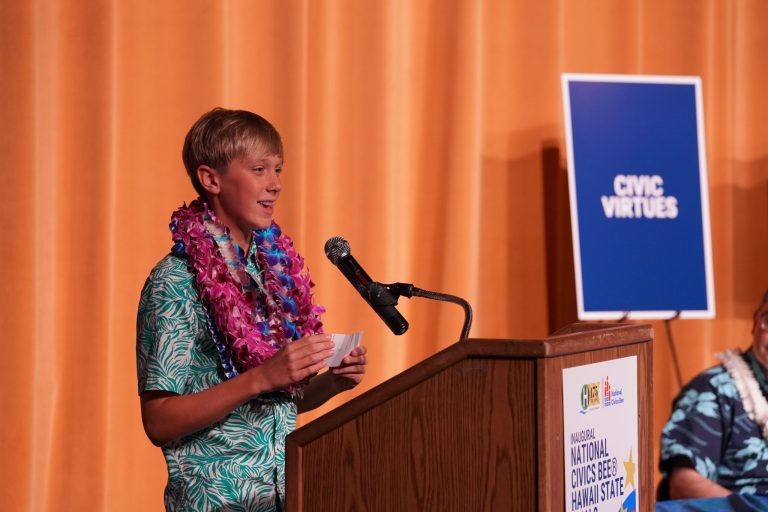U.S. Chamber of Commerce Foundation: Hawaii Winner Leads the Way

July 31, 2025
When Ryker first heard about the National Civics Bee® from his social science teacher, it wasn’t the word “civics” that caught his attention—it was the opportunity to make a difference. “I didn’t even know civics was a subject,” Ryker admits. But the idea of solving real problems in his community sparked a deep interest in taking action.
That spark led Ryker to become the only student from his district to qualify for the Hawaii State Finals hosted by the Chamber of Commerce Hawaii. He stood out for his thoughtful and practical approach to an issue many overlook: the lack of clean, accessible public bathrooms across Hawaii. His essay, inspired by a family trip to New Zealand, proposed the installation of single-stall, easy-to-maintain public bathrooms that could improve comfort, sanitation, and dignity for all.
“I am really passionate about simple issues that we don’t think too much about, such as public bathrooms or housing issues,” Ryker explains. For him, these small, day-to-day challenges are where civic engagement can have the most powerful and lasting impact. “Without civic engagement we don’t really have democracy,” he says. “With civics, everyone from the community can step up to solve [these] issues.”
Ryker’s essay impressed more than just the judges. At the state competition, his district representative, Garner Shimizu, attended in person to show his support, offer a prayer, and present him with a lei. “It was super meaningful that he came to support me,” Ryker recalls.

That encouragement extended to Ryker’s family and teachers, who helped him prepare for the competition. “I had a lot of support from my family,” he shares. “My teachers were super supportive and thought it was awesome I made to the National Civics Bee.” Ryker dedicated 30 minutes each day to studying and reviewing foundational documents, such as the Declaration of Independence and the Gettysburg Address.
Even more impactful, Ryker’s proposal sparked real legislative action. Representative Shimizu was impressed by Ryker’s research and use of statistics. “We stayed in touch,” Ryker said, “and we are hoping to pass a bill to get it approved for the budget next year.”
As Ryker prepares to travel to Washington, D.C. for the National Championship, he is looking forward to continuing his civic journey and deepening his engagement. “I am really excited to see the national monuments,” he says.
From identifying a public need to proposing real policy change, Ryker reminds us that no issue is too small when viewed through the lens of civic responsibility. Sometimes, it’s the everyday challenges that reveal the deepest needs—and the greatest opportunities for change.
